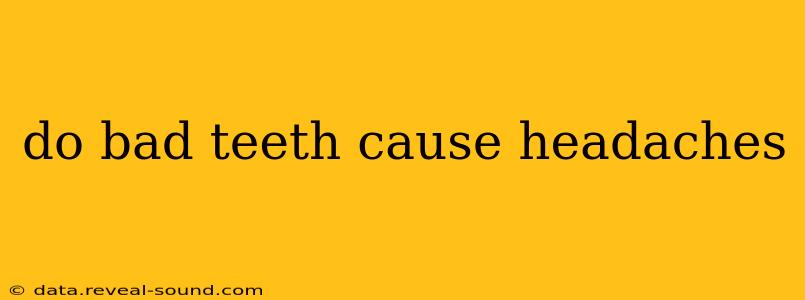Many people experience headaches, and while the causes are diverse, the connection between oral health and head pain is a frequently asked question. So, do bad teeth cause headaches? The short answer is: yes, they can. But it's not always a straightforward relationship, and understanding the mechanisms involved is crucial.
This article will explore the various ways poor dental health can contribute to headaches, answering common questions and providing insights into prevention and treatment.
How Can Bad Teeth Lead to Headaches?
The link between bad teeth and headaches often stems from problems within the temporomandibular joint (TMJ), the jaw joint connecting your jawbone to your skull. Issues like:
-
Temporomandibular Joint Disorders (TMJD): TMJD encompasses a range of conditions affecting the TMJ. Problems like teeth grinding (bruxism), clenching, misaligned bites (malocclusion), or trauma to the jaw can strain the joint, leading to pain that radiates to the head, often manifesting as headaches. Infections or abscesses in the teeth can also exacerbate TMJD symptoms.
-
Sinus Infections: Severe tooth infections can spread to the sinuses, causing sinusitis. Sinus infections can cause pressure and pain in the forehead, temples, and cheeks, often mimicking headache symptoms.
-
Referred Pain: Nerve pathways in the head and face are complex. Pain from a severely decayed tooth, gum infection (gingivitis or periodontitis), or an abscessed tooth can be misinterpreted by the brain as originating from another area, such as the head, leading to headaches.
What Types of Headaches Can Bad Teeth Cause?
Bad teeth aren't directly responsible for all types of headaches, but they are strongly linked to certain kinds:
-
Tension Headaches: These are the most common type, often caused by muscle tension in the head, neck, and shoulders. TMJD issues, stemming from dental problems, can significantly contribute to muscle tension and thus tension headaches.
-
Migraines: While not directly caused by bad teeth, dental issues can trigger migraines in susceptible individuals. Stress related to dental pain or the need for treatment could act as a migraine trigger.
-
Cluster Headaches: There's less direct evidence linking bad teeth to cluster headaches. However, any source of significant pain or stress in the body could potentially influence the frequency or intensity of these severe headaches.
Can a Toothache Cause a Headache?
Yes, absolutely. A toothache, itself a result of dental problems like cavities, infections, or gum disease, often causes pain that radiates to the head, manifesting as a headache. The intensity of the headache is usually directly proportional to the severity of the toothache.
How Can I Tell if My Headache is Related to My Teeth?
Differentiating between headaches originating from dental problems and other causes can be tricky. However, certain indicators can help:
- Pain Location: Headaches linked to teeth often focus around the jaw, temples, or forehead, depending on the affected tooth.
- Jaw Pain or Stiffness: Pain or limited movement in the jaw is a strong indicator of TMJD involvement.
- Tooth Sensitivity: Increased sensitivity to hot or cold temperatures in a specific tooth might suggest a dental origin for your headache.
- Pain Worsening with Chewing: If your headache intensifies when you chew or bite down, it points towards a dental or TMJ-related problem.
If you suspect a dental connection to your headaches, it's crucial to consult a dentist and possibly a doctor specializing in headaches (neurologist).
What Should I Do if I Suspect My Teeth are Causing My Headaches?
Don't delay seeking professional help! See your dentist for a thorough examination. They can diagnose any underlying dental problems and recommend appropriate treatment. This could range from simple fillings and extractions to more complex procedures like root canals, crowns, or orthodontics to correct misalignment. In some cases, referral to a specialist like an oral surgeon or a TMJ specialist might be necessary.
Proper dental hygiene, including regular brushing, flossing, and professional cleanings, is essential for preventing dental problems and reducing the risk of headache development. Managing stress and maintaining a healthy lifestyle also play vital roles in preventing various types of headaches.
This information is for educational purposes only and should not be considered medical advice. Always consult with a healthcare professional for any health concerns or before making any decisions related to your health or treatment.
